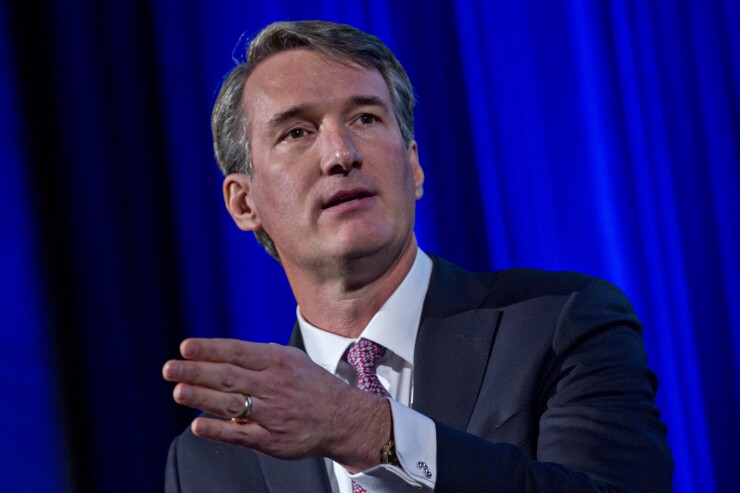Virginia lurches towards passing a budget in special session
4 min read

The Virginia General Assembly is set to pass a new budget next week after a saga that saw the state’s Republican governor and the Democratically controlled legislature clash over environmental issues, school funding, and pay-fors.
Although the budget deal still needs to be officially approved during the special session that begins Monday, Gov. Glenn Youngkin is already declaring victory. “Gov. Youngkin is grateful for all the members of the General Assembly as well as the leadership, and conferees for their ongoing efforts to deliver a budget,” his office said in a statement. “He looks forward to finishing the work to deliver on our collective priorities for all Virginians next week.”
Bloomberg News
The bond rating agencies have been monitoring what’s going on in Richmond while also separating the politics from the commonwealth’s ability to pay its bills.
“I don’t think that the budget process poses any particular stress on the credit rating,” said Michael D’Arcy, director and Fitch’s lead analyst for Virginia. “I think that Virginia is a triple-A long-term issuer. The ratings are quite solid. I don’t think that a protracted budget process and the calling of a special session really represents a threat.”
Renewing the commonwealth’s participation in the Regional Greenhouse Gas Initiative has remained a non-starter for the Governor and appears to be axed from the budget. Eleven states are participating in the “cap and invest” plan the puts a yearly declining cap on CO2 emissions from power plants and auctions off credits to regulate the emissions.
Preliminary glimpses of the budget’s working draft reveal agreements on a 3% raise for teachers, state employees and education funding.
Ways to pay for the bumps include applying state sales to digital downloads including software and music. Businesses would be included in the new tax base but according to the Governor’s plan, the upcharges would be countered by personal income tax cuts. In earlier debates, the legislature rejected the income tax cuts.
One of the major sticking points is what to do with Virginia’s budget surplus, a common issue for many states. Many states are kicking surpluses back to taxpayers in the form of tax cuts.
Fitch charts Virginia’s rainy-day funds topping $5 billion by June 30. For comparison in 2020 the commonwealth was sitting on between $400 million and $500 million
S&P Global Ratings is also shrugging off the last-minute machinations. On May 1, the agency issued an AA+ grade to Virginia Public Building Authority’s series 2024A public facilities revenue bonds, 2024B public facilities revenue refunding bonds, and 2024C public facilities revenue bonds, totaling approximately $507.5 million.
Per their statement, “The governor’s originally proposed $62.9 billion fiscal year 2025 and 2026 biennium general fund budget and a subsequent version from the general assembly have been set aside and all parties are working toward a new budget document with a goal of adopting it at a special legislative session in the middle of May.”
“The new fiscal year begins on July 1, so there is time for the commonwealth to adopt a budget before the start of the new biennium.”
Funding state pensions often show up as a financial achilles heel and Virginia has a troubled past.
“They went through a period after the Great Recession for several years where they didn’t make full contributions as part of budget balancing moves,” said D’Arcy.
“There was a meager revenue growth period, from 2009 to about 2015 but they returned to making full contributions a few years ago along with supplemental pensions to boost the annual funding above the required levels.”
Failure to approve a budget on time could lead to a calamitous shutdown of state government barring any special resolutions or extensions.
The bumpy timeline leading to the special session began in
By March, opposition to the plan had stiffened and it was knocked out of the budget by Senate Finance and Appropriations Chairwoman L. Louise Lucas. Lucas was looking for toll road relief in her home district around Hampton Roads.
Later in
In early April Youngkin proposed a rewrite of the state budget that was approved by the assembly and then amended by him with 233 adjustments. The rewrite avoided a veto and a total do-over, but eventually led to the special session.







